Let’s learn how to make classic sponge cake. This light and airy sponge cake is a perfect base for many delicious cakes! With just 3 ingredients, this cake is quick and easy to make, and very versatile to flavor and decorate.
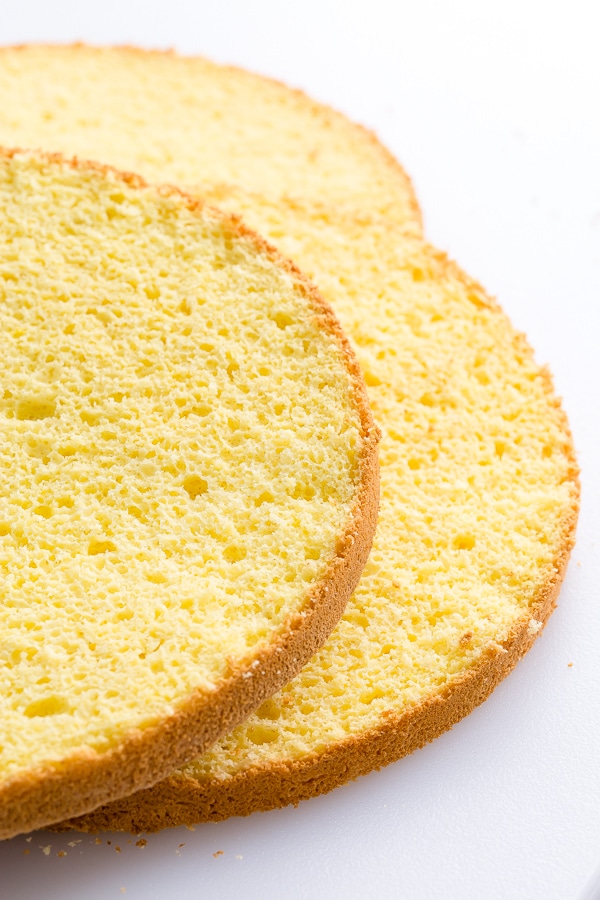
Table of Contents
- What is sponge cake?
- Types of Sponge Cake
- What is the difference between sponge cake and regular cake?
- What is the difference between angel food cake and sponge cake?
- How sponge cake is different from génoise and gâteau?
- Classic Sponge Cake Recipe Tips
- Sponge Cake Recipe Easy Ingredients
- How to make a Sponge Three Ingredient Cake
- Ways to serve this Easy Sponge Cake Recipe
- Storing Three Ingredient Cake
- Sponge Cake Simple Recipe FAQ
- My Favorite Cake Recipes
- More Favorites from Sweet & Savory
- 3 Ingredient Sponge Cake Recipe Recipe
What is sponge cake?
Before we dive into the technique, let’s talk about what is sponge cake.
Sponge cake is a type of foam cake where the tall and airy texture comes from whipped eggs without chemical leaveners like baking soda or baking powder. Classic sponge cake, like this one, is fat-free cake, meaning there is no butter or oil in the batter.
While sponge cake is beautifully tall, fluffy and light, this is not moist kind of cake. Sponge cake tends to be a little on drier side. BUT this is actually an advantage of this cake, because you can infuse the cake layers with all kinds of delicious syrups, liquors and fruit sauces. Once assembled, these beautiful sponge layer cakes won’t be dry at all.
Why is it called Sponge Cake?
Air-leavened cakes are called sponge cake because they’re meant to soak up various sugar or fruit syrups like a sponge. Also, the texture of the cake resembles a sponge.
Types of Sponge Cake
What is the difference between sponge cake and regular cake?
Sponge cake is leavened by whipped eggs and doesn’t contain chemical leavening agents, like baking power or soda. Regular butter cake, on other hand, relies on baking powder and soda to rise.
What is the difference between angel food cake and sponge cake?
Angel food cake is made of all egg whites, while sponge cake is made of whole eggs.
How sponge cake is different from génoise and gâteau?
Génoise and gâteau are also a variation of foam cake, but unlike sponge cake, they have a little bit of butter in the batter.
Though it’s very easy to make a classic sponge cake, there’re a few important notes to keep in mind for optimum success.
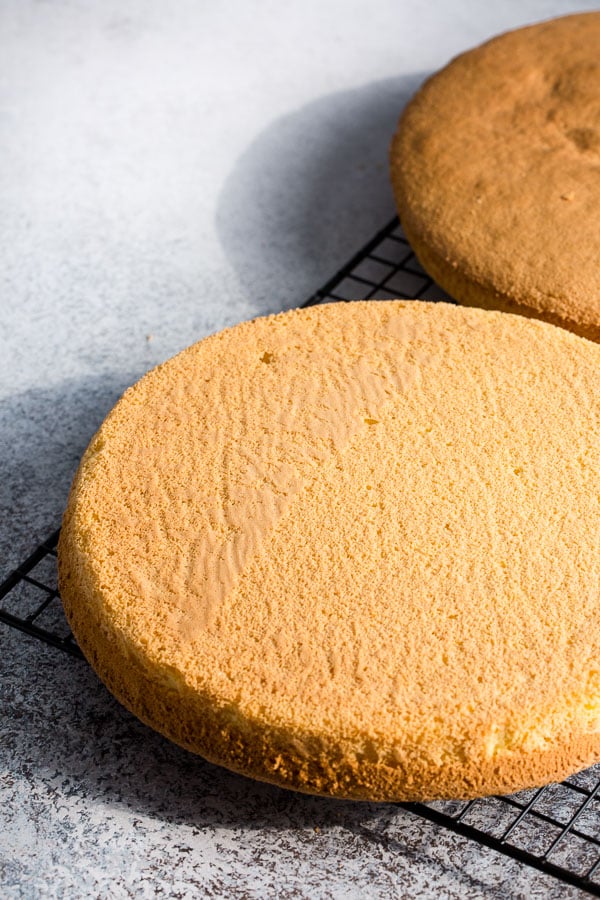
Classic Sponge Cake Recipe Tips
- Be careful when separating the egg whites and yolks. You don’t want any kind of fat/yolk in your egg whites, or egg whites won’t whip into stiff peaks. Here’s how I separate egg whites and egg yolks: I set out 3 bowls. One for collecting egg whites, one for collecting egg yolks and one for breaking each egg. I break one egg over my “working bowl” and gently drop egg whites while transferring egg yolk back and forth between the shells. Then I transfer the egg white into “egg white bowl” and egg yolk into “egg yolk bowl”. This way if you accidentally break an egg yolk, you won’t ruin the whole batch of egg whites you so carefully separated. Trust me, this lesson comes from numerous real-life accidents!
- It’s easy to separate cold eggs, but room temperature eggs whip better. I recommend separating the eggs right way when you bring them out of the fridge and at least 30 minutes before you start making the cake.
- It’s very important to whip the eggs properly and long enough to incorporate as much air as possible. Again, this sponge cake depends on air whipped into the eggs, because we’re not using any chemical leaveners! Properly whipped egg yolks should become creamy pale and at least triple in size. Egg whites should reach stiff peaks, which means when you turn the bowl with stiff meringue upside down, it won’t slide down. However, be careful not to over-beat the egg whites. I know, it’s kind of confusing. But just keep an eye on meringue at this stage. The meringue should still be glossy and have stiff peaks.
- Bake the cake as soon as you make the batter, and don’t let the meringue sit for too long.
- Don’t grease the cake pan. Like angel food cake, sponge cake sticks to the sides of the pan while it rises in the oven and stays nice and tall.
- Don’t open the oven door while baking a sponge cake for at least first 20 minutes, or you risk deflating the cake.
- It’s easier to cut the cake into layers when the cake is fully chilled, preferably overnight. Freshly cooled cake falls apart easily and it’s difficult to cut into layers. That’s why it’s perfect cake to bake ahead.
- When assembling the cake, make sure to brush on simple syrup, or any kind of flavored syrup, liquor or fruit sauce to moisten the cake layers, or the cake will be a bit dry. Sponge cakes take on flavors beautifully!
Ok, onto the step by step instructions with photos!
Sift the cake flour to aerate it. More air, taller the cake!
Sponge Cake Recipe Easy Ingredients
- Eggs – Be sure to use room temperature eggs, as it’s easier to beat air into room temperature eggs.
- Sugar – Fine granulated sugar or caster sugar is ideal for this recipe, as they dissolve quicker.
- Cake flour – Low protein cake flour produces lighter and more tender crumb.
No cake flour? No problem!
If you don’t have cake flour on hand, don’t worry. It’s super easy to make your own. I do that all the time. Here’s a fabulous tutorial for homemade cake flour, if you have time to read.
But in short, measure 1 ½ cups of all-purpose flour, remove 3 tablespoons of flour, and replace 3 tablespoons of cornstarch. That’s it! Now you just need to sift it well and you’ve got yourself a cake flour.
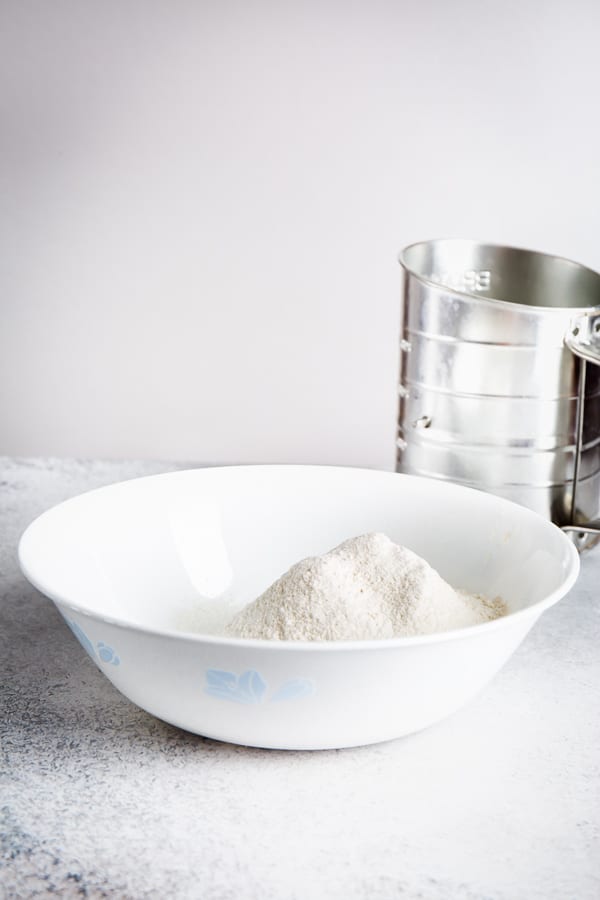
How to make a Sponge Three Ingredient Cake
Beat the egg yolks with half of the sugar until creamy pale and at least tripled in size. Most of the sugar granules should be completely melted.
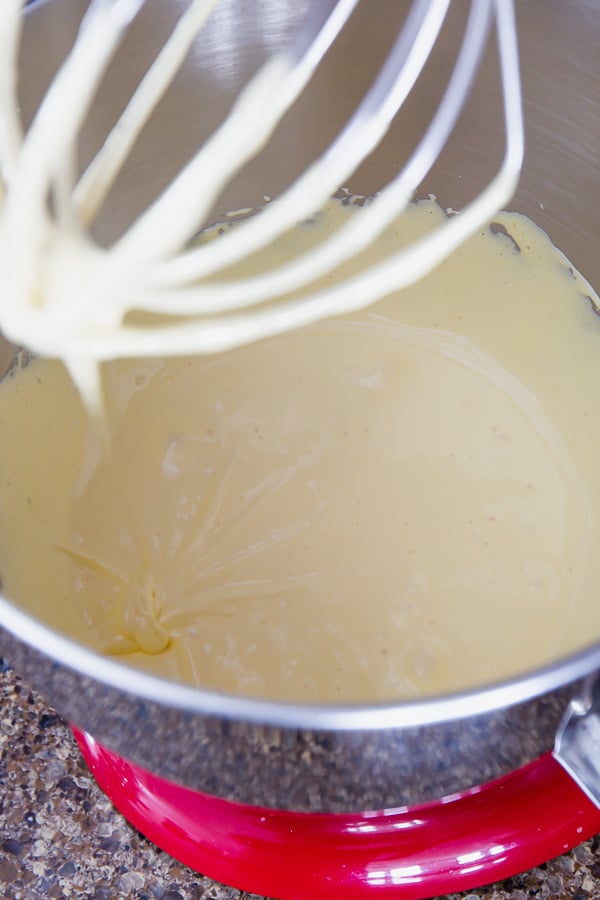
Whip the egg whites into glossy meringue with stiff peaks. This is the secret to nice tall and light cake.
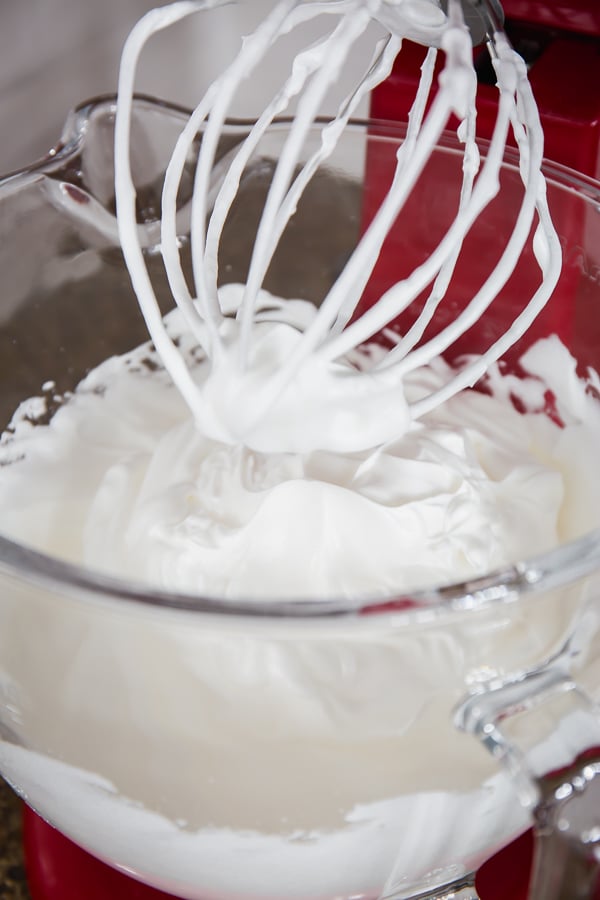
Now carefully fold in the meringue into the egg yolk mixture in 3 stages. It’ll be easier to incorporate egg white in stages. Be careful not to deflate the batter! We need all that air for beautiful tall cake!
And then add flour also in stages to ensure a nice and smooth batter.
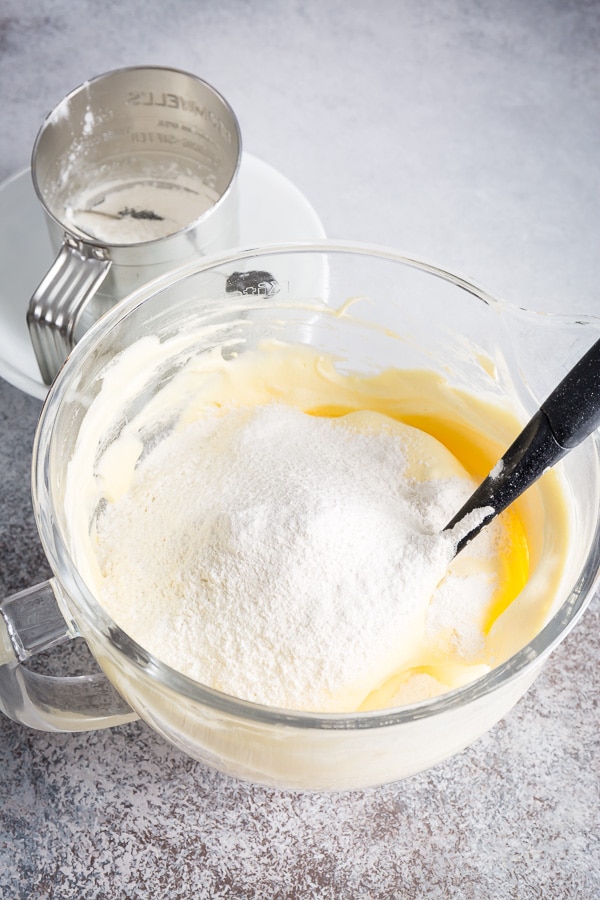
I absolutely LOVE this beautiful velvety batter!
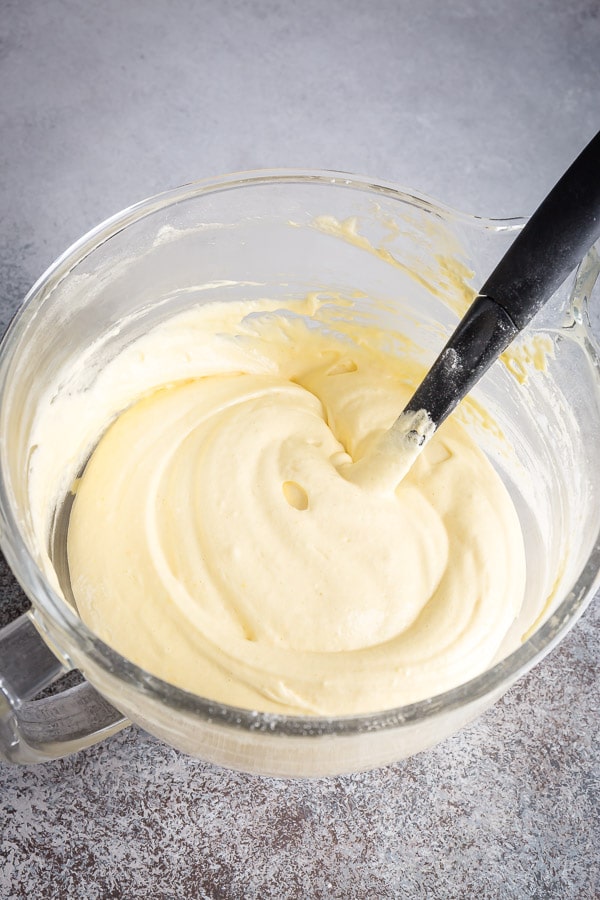
You can bake this cake into one tall cake, or divide the batter into 2 9-inch cake pans. If baking in one pan, make sure the pan is at least 3 inches tall.
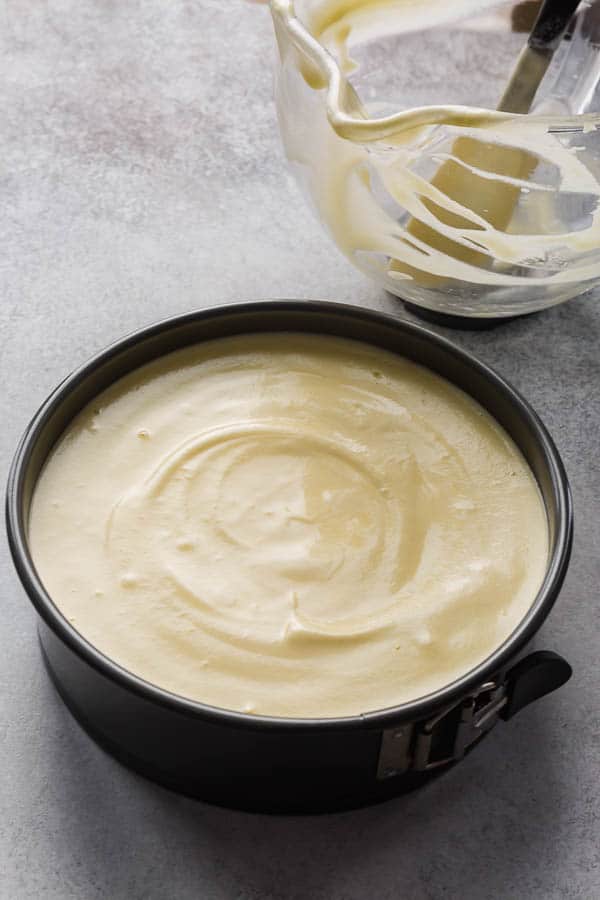
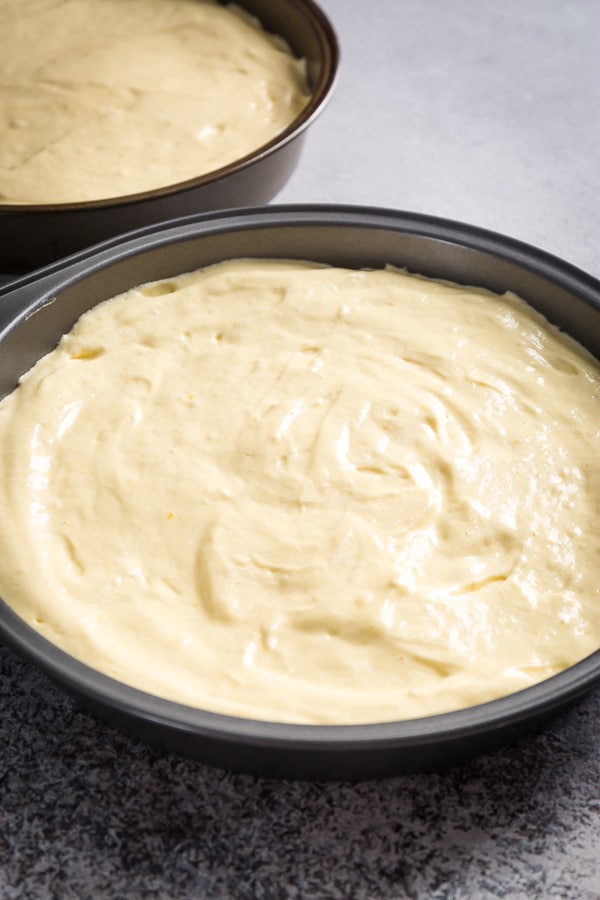
Now, how gorgeous is that sponge cake?!! It’s now ready to take on all the flavors!
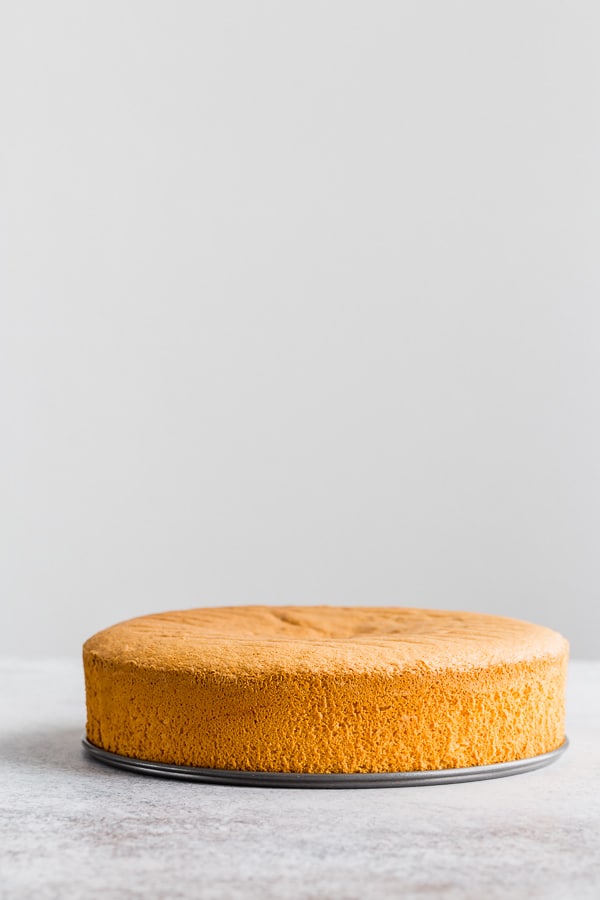
I bake 1 tall cake if I want 3 layers, but if I want 4-6 layers I usually bake in 2 or 3 cake pans.
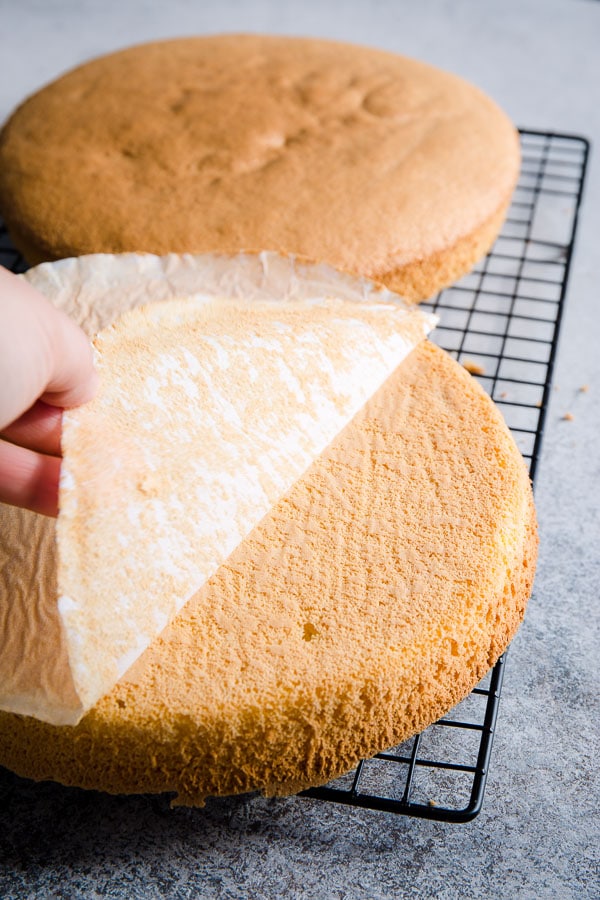
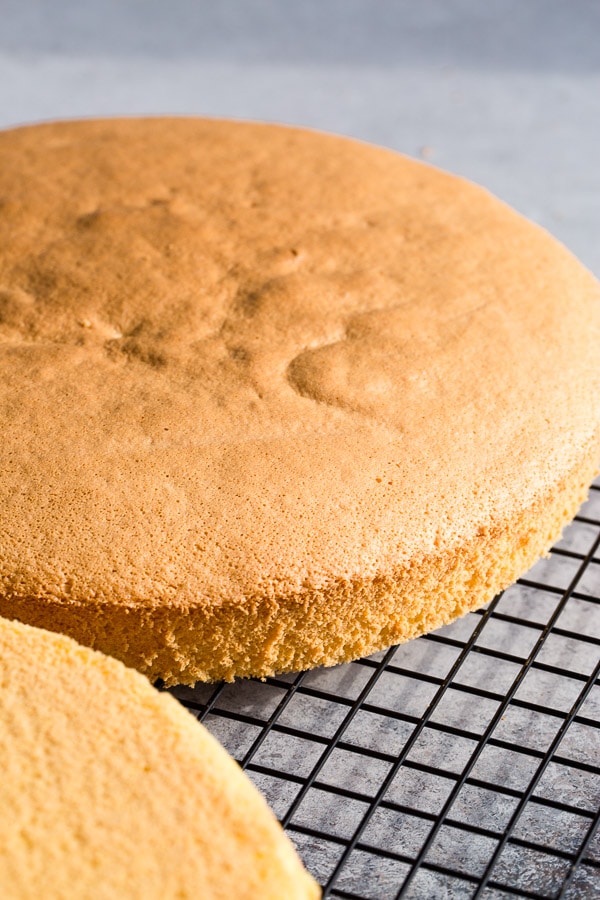
Ways to serve this Easy Sponge Cake Recipe
- This simple sponge cake layer is a perfect canvas for all kinds of layer cakes.
- Pair it with fruit or sugar syrups and fill with your favorite frosting for delicate and light layer cake.
Storing Three Ingredient Cake
How long does sponge cake last in the fridge?
The sponge cake, tightly wrapped in plastic wrap, can be refrigerated for up to 1 week.
Sponge Cake Simple Recipe FAQ
Frosted sponge cake is good for up to 5 days in the refrigerator.
The baking time depends on the size of the pan(s). It takes about 40 minutes for one 9-inch cake pan. And about 25-30 minutes for two 9 or 8-inch pans, or three 7 or 6-inch.
Plain sponge cake does have lower calorie count as it doesn’t contain butter.
Straight sponge cake tastes a little dry and plain. They’re meant to be drizzled with fruit or sugar syrup and frosted with frostings and fillings.
The secret to a good sponge cake is to whip the eggs until thick and tripled in size. And don’t deflate too much air during mixing it with flour.
My Favorite Cake Recipes
- Peach upside down cupcakes are my summer-time favorite cake!
- Strawberry matcha roll cake is also super light and flavorful cake.
- Angel food cake is another classic recipe every baker should have in their repertoire.
More Favorites from Sweet & Savory
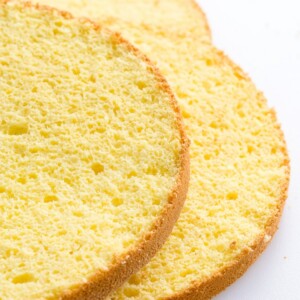
3 Ingredient Sponge Cake Recipe
Ingredients
- 6 large eggs at room temperature
- 1 cup (200g) granulated sugar divided Note 1
- 1 ½ cups (180g) plain cake flour
- ½ teaspoon salt optional
Instructions
- Preheat the oven to 350°F (177°C). Line bottom of 1 9-inch springform pan (at least 3 inches tall) or 2 regular 9 or 8-inch cake pans with parchment paper. No need to grease the pan.
- Separate egg whites and yolks, making sure not even a little bit of egg yolk gets into the whites. (TIP: It's easier to separate the egg when they're cold right out of the fridge.)
- In a mixing bowl with whisk attachment, whisk together egg yolks and ½ cup of sugar until pale and tripled in volume, about 5 minutes.
- Meanwhile, sift flour and salt.
- In another mixing bowl with whisk attachment, beat egg whites at medium low speed until foamy.
- Add remaining ½ cup of sugar 1 tablespoon at a time and continue to whisk until stiff peaks, gradually increasing the speed to medium high, 7-10 minutes.
- Using a spatula, add 1/3 of the whipped egg whites into the egg yolk mixture and gently fold until mostly smooth. Add the remaining egg whites and gently fold until smooth.
- Add sifted flour into the batter in 3 stages, whisking the batter well after each addition.
- Pour the batter into prepared pan and smooth the top.
- Bake the cake until inserted toothpick comes out clean, about 40 minutes. Don’t open the oven for at least the first 30 minutes!
- Let the cake cool for 5 minutes in the pan. Then run a knife around the edges and invert onto a cooling rack. Cool completely. Once cooled, wrap with plastic wrap and refrigerate, preferably overnight. It’ll be easier to cut when the cake is thoroughly chilled.
- The sponge cake, tightly wrapped in plastic wrap, can be refrigerated for up to 1 week, or frozen for up to 1 month.
Tips & Notes
You can use any size of cake pan for this recipe. I’ve tested this recipe in one 9-inch pan at least 3 inches tall, two 9 or 8-inch cake pans at least 2 inches tall, three 7 or 6-inch cake pans at least 2 inches tall. In one 9-inch springform pan, the cake comes out 2 1/4 inches tall, perfect for slicing into 3 layers.
1 9-inch cake pan – about 40 minutes
2 9 or 8-inch pans – 25-30 minutes
3 7 or 6-inch pans – 25-30 minutes
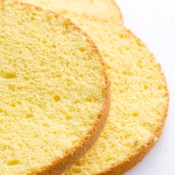

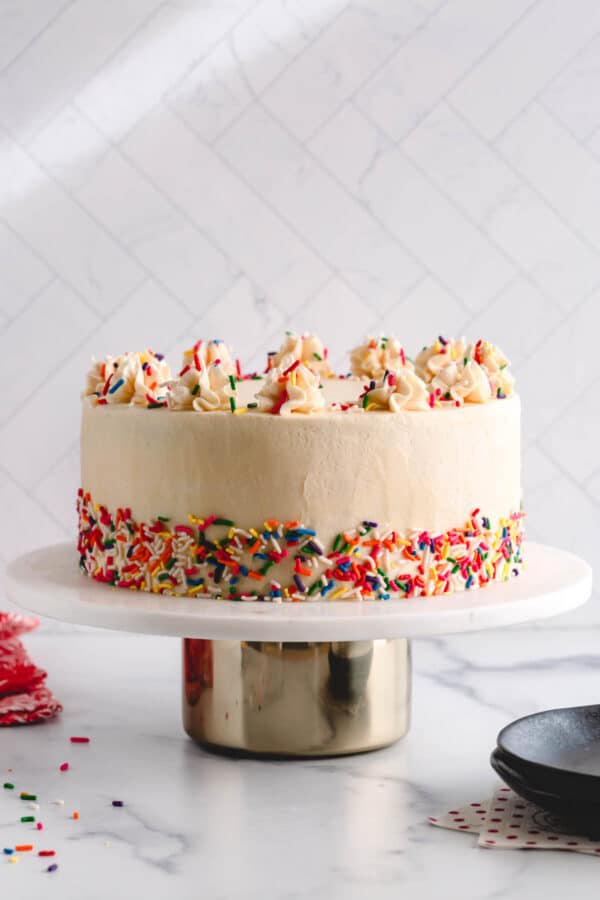
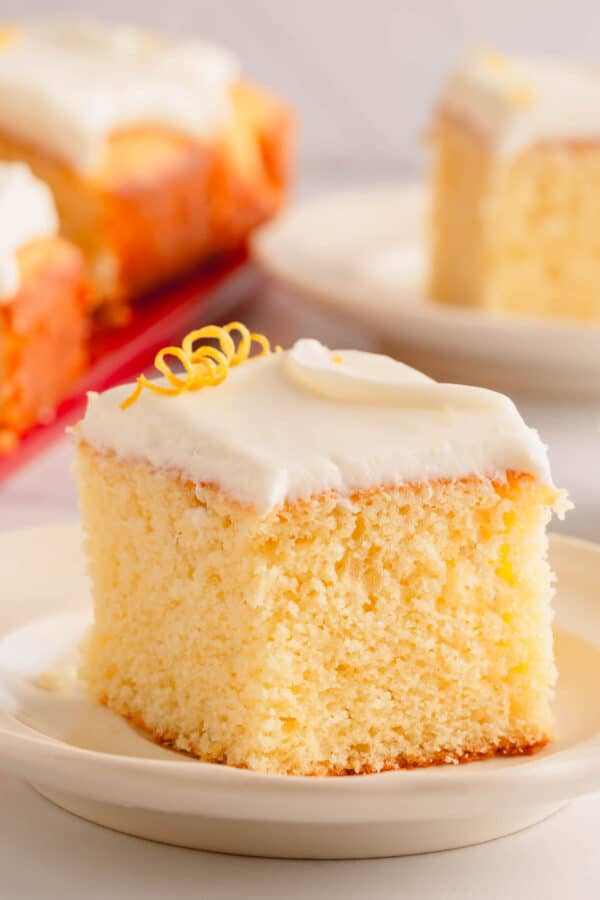
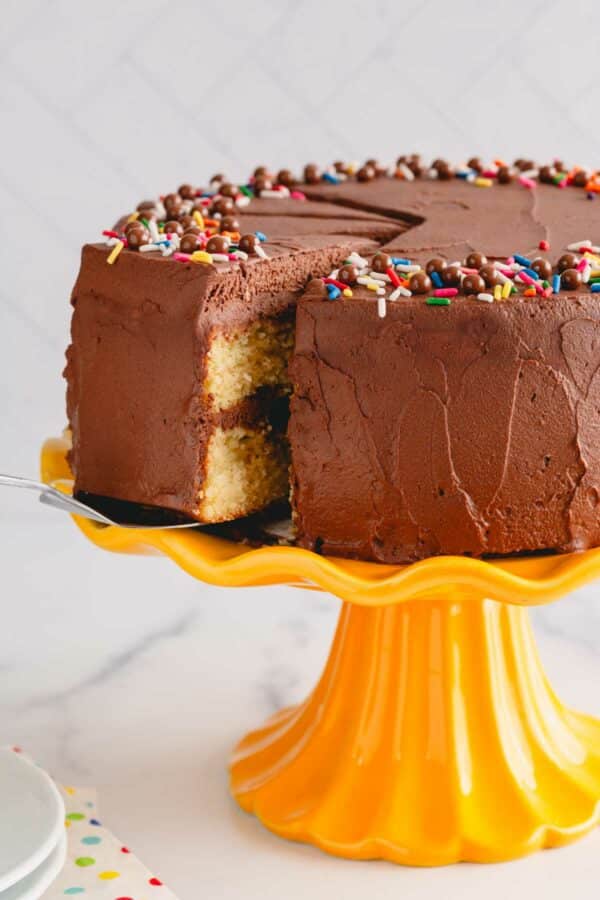
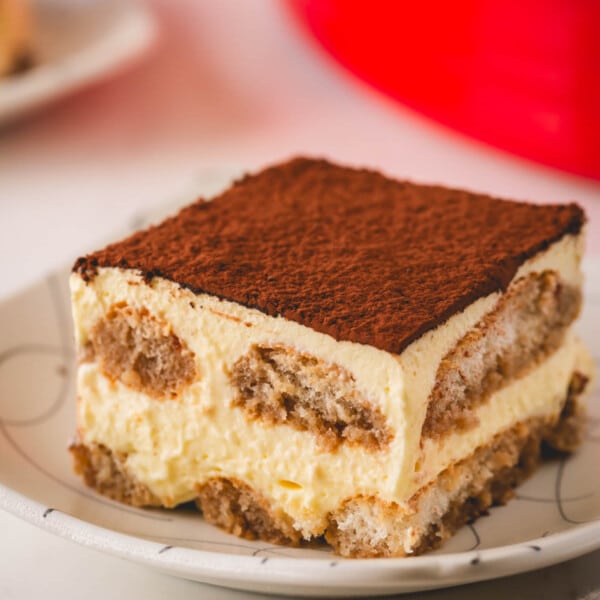

could I use egg substitute for the eggs in this sponge cake recipe?
Hi, Angela. I don’t recommend it as I’ve never tested this recipe with egg substitute.
Hello Shinee. I just want to ask if I can use this recipe to make a Swiss Roll? Thanks.
I haven’t made the cake yet, but I’m eager to! I am just unsure as to whether or not i need some sort of membrane between the pan and batter like parchment paper since you said not to grease it. This is coming from a complete baking amateur so I’m not sure how silly this question is, lol.
Hin Tentra. Yes, you do need to line the pan with parchment paper, but only on the bottom. You don’t need anything on the sides.
Your beating times are way too long, this cake was hard and way too sweet. Don’t waste your time or your eggs!
Bummer that you didn’t follow the recipe. The beating the egg whites and yolks for that long is the KEY to fluffy and tall cake. Because there’s no leavening agent in the cake, it’s crucial to beat as much as air into the batter.
Boy this really looked good and was looking for a light cake, but oh my gosh, it turned out like a tasteless pound cake. Followed the directions to the tee. Would love to make this right. Don’t know what went wrong any ideas?
Hi, Kathleen! It’s all about whipping the eggs enough because air whipped into the eggs is the only leavening agent in this cake. If you don’t whip enough air into egg yolks and whites, your cake won’t rise well. So, I’d pay closer attention to whipping the egg whites and yolks. Also, be sure not to grease the cake pans!
Should you add cream of tartar or vinegar or lemon juice to stabilize the egg whites?
You sure could, Spencer. I usually don’t add any of those when making sponge cake though.
I made this for my dad’s birthday cake and I love it! I was just a bit concerned as I was baking that I smelt like scrambled egg. I was afraid it would taste like egg. It did just a bit, but it wasn’t overpowering. But for future, would you recommend adding vanilla essence?
Also do you rhink I can convert this to other flavours – like chocolate, lemon, etc? If so, do you have tips on subtitions and additions to this recipe?
Hi, Vel. So happy you tried this recipe!! Yes, you can absolutely add different flavors, like vanilla extract, lemon juice/zest, etc. This basic version is a perfect blank canvas and ideal for brushing on flavored sugar syrups. Here’s my lemon sponge cake.
Hi!
I want to make this for my parents anniversary
and is it possible to make this with greek yoghurt as a substitute for the eggs?
Thanks!
Sejal, I haven’t tested this recipe without eggs. Therefore, I cannot provide adequate advice.
Hi!
I want to make this for my parents anniversary
and is it possible to make this in a square pan
and then cut it into circles to make a dome
thanks!
Hi, Sejal. Yes, you can bake this in a square pan!
Thank you!!!!
Brilliant results and easy. Thank you!
Thanks so much for your feedback, Tracey!